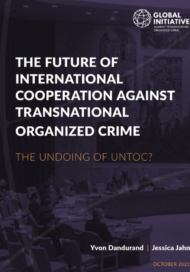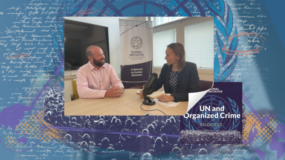Posted on 09 Dec 2021
On 22–23 November 2021, the United Nations General Assembly held a high-level meeting to appraise the UN Global Plan of Action to Combat Trafficking in Persons. The impacts of the pandemic took centre stage, with forced labour and online trafficking the focus.
At the recent General Assembly meeting, governments focused on the COVID-19 pandemic as an accelerator for human trafficking, and particularly two issues: forced labour and the growth of online human trafficking.
A pandemic of vulnerability
The ongoing pandemic exacerbated existing risks and made larger groups of people vulnerable to poverty, as border closures, early lockdowns and the continuing economic fallout left these groups subject to exploitation.
Ghada Waly, director of the United Nations Office on Drugs and Crime, highlighted the need to pay more attention to monitoring labour markets and addressing vulnerabilities to exploitation. Several countries, including Egypt, Nepal and Bangladesh, called for more support for migrant workers, and Bangladesh in particular vouched for the inclusion of migrant workers in COVID-19 recovery plans. South Africa said that labour exploitation complaints had increased during the pandemic, while the UK called for more transparency in global supply chains.
Increased time spent online during solitary periods brought on by the pandemic heightened already alarming risks related to online human trafficking, such as online recruitment and anonymity. Thailand, for instance, said that although COVID-19 restrictions impeded cross-border human trafficking, there was an increase in online sexual exploitation, with more opportunities to recruit victims and hide illegal content. Some states outlined specific ways online recruitment occurs, such as on gaming platforms. One example, disclosed by the Democratic Republic of Congo, involved a scheme where young people were made to believe they had received an academic scholarship, were sent airline tickets and at the destination found themselves in situations of sexual exploitation or forced labour.
Building new partnerships
In her opening remarks in the plenary, Special Rapporteur on Trafficking in Persons Ms Siobhán Mullally noted the dual nature of digital technologies – that they can both increase opportunities for human trafficking and help implement more effective responses. This was the focus of the Global Initiative Against Transnational Organized Crime (GI-TOC) during a side event co-hosted with Romanian anti-human trafficking organization eLiberare on the need for partnerships to help combat human trafficking.
With a call to action from the American and Swedish ambassadors-at-large for combating human trafficking, John Richmond and Anna Ekstedt, speakers at the event discussed a wide range of partnerships. Ioana Bauer from eLiberare discussed how beauty shops are key locations where women and girls are often left alone by captors for short periods of time and are potential areas for intervention and disruption. Marie Ringler from Ashoka, an organization promoting social entrepreneurship, raised existing efforts by employees who work in the transport industry to report human trafficking and identify victims. Judge Iulia Motoc of the European Court of Human Rights focused on how important it is to build relationships with victims, while Richard Pugh-Cook, UK Serious Organized Crime network’s regional coordinator, spoke of the importance of multilateral organizations in building bridges between countries with weak bilateral relationships and noted growing challenges to working with civil society groups in some countries. The GI-TOC discussed its involvement in the Tech Against Trafficking initiative, a coalition of technology companies seeking to use technology solutions to combat human trafficking.
The 2021 Political Declaration on the Implementation of the Global Plan of Action to Combat Trafficking in Persons was adopted by consensus at the beginning of the meeting. Yet the world outside continues to clash with the sense of agreement at the UN. Highlighted in the declaration was the need to address human trafficking in all circumstances, including situations of armed conflict, natural disasters and humanitarian emergencies. Governments pledged to prevent trafficking of people from vulnerable groups and committed to strengthening pathways for orderly migration. Yet a number of EU member states used the opportunity to call out Belarus (known within the UN as a leader of the anti-trafficking agenda) for granting short-stay visas to vulnerable groups in order to create a migrant crisis at the EU border in Poland. Although tangential to a human trafficking debate, inserting this issue in the discussions brings to light the continued political flashpoint of migration, which sits uneasily with efforts to tackle human trafficking and protect vulnerable groups.
The eLiberare–GI-TOC event can be viewed here



